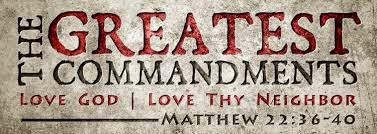Barry was very heavily into the social justice teachings of the Catholic Church. He was not afraid to challenge authority, religious or civil, including bishops, politicians, and even the Provincial General of his own religious order, if he thought that any action being taken by them was against the gospel of Jesus. Working with Barry all those years probably accounts for some of the religious and political values for which I stand today, and was a preparation ground for ministering later at St. Stephen's Catholic Church in South Minneapolis.
The way Barry would evaluate a pastoral situation was to ask 2 questions. The first being, "Just what does this have to do with heaven?" The second question was phrased more like, "How does the great commandment of Jesus, loving God and neighbor, apply to this situation?" These two measuring sticks by which Barry evaluated pastoral situations and conundrums have remained with me 25 years later.
I remember on one occasion when Barry, reflecting on the close to 1800 Canonical laws that govern the Roman Catholic Church, saying, "The law of Jesus is so simple, 'love God with all your heart, mind and soul, and, love your neighbor as yourself.' Why has the Church complicated this simple law so terribly?"
 The quote that was the centerpiece of last week's gospel, "Give to Caesar's what is Caesar's, give to God what is God's", flows directly from the great commandment of Jesus. If we truly worship the presence of God in all living things, especially in the people whom we encounter, then civil society will be sustainable and orderly. Is not truly loving and serving God in one another one of the highest forms of worshiping God? In no way is this to minimize our call to worship God on Sunday at Mass. However, if we limit our worship of God to just sacramental ritual and prayer while we ignore and neglect the presence of God in our neighbor, then our rituals are merely paying lip service to God, empty gestures that lack authenticity.
The quote that was the centerpiece of last week's gospel, "Give to Caesar's what is Caesar's, give to God what is God's", flows directly from the great commandment of Jesus. If we truly worship the presence of God in all living things, especially in the people whom we encounter, then civil society will be sustainable and orderly. Is not truly loving and serving God in one another one of the highest forms of worshiping God? In no way is this to minimize our call to worship God on Sunday at Mass. However, if we limit our worship of God to just sacramental ritual and prayer while we ignore and neglect the presence of God in our neighbor, then our rituals are merely paying lip service to God, empty gestures that lack authenticity.In the 11th chapter of St Paul's 1st letter to the Corinthians, St Paul raises this precise point. Within the Corinthian community there is division, people refusing to recognize the presence of Christ within one another.
" I do not praise the fact that your meetings are doing more harm than good. First of all, I hear that when you meet as a church there are divisions among you, and to a degree I believe it; there have to be factions among you in order that (also) those who are approved among you may become known. When you meet in one place, then, it is not to eat the Lord’s supper, for in eating, each one goes ahead with his own supper, and one goes hungry while another gets drunk.Do you not have houses in which you can eat and drink? Or do you show contempt for the church of God and make those who have nothing feel ashamed? What can I say to you? Shall I praise you? In this matter I do not praise you." (1 Cor 11: 17-22)
St. Paul continues that in disrespecting the presence of Christ in one another, they are guilty of murdering the Body of Christ just as surely as those who crucified Jesus on Calvary. When they eat the body and blood of Jesus in the Eucharist, they are eating and drinking their own damnation.
"Therefore whoever eats the bread or drinks the cup of the Lord unworthily will have to answer for the body and blood of the Lord. A person should examine himself, and so eat the bread and drink the cup. For anyone who eats and drinks without discerning the body, eats and drinks judgment on himself." (1 Cor 11: 27-29)
St. Paul reminds us that whenever we gather together as the Body of Christ to celebrate the Mass, the face of God whom we worship is on the face of our neighbor. The two parts of the Great Commandment are inseparable. One cannot just do one and ignore the other. We enflesh the love, praise and thanks we give to the God whom we worship at Mass, by our serving and loving the God in one another. It is at Mass that we are fed by the Word of Jesus and the Body and Blood of Jesus so that we can then be sent forth into the world to be Christ to one another.
What does the Great Commandment of Jesus have to do with Heaven, as Fr Barry Schneider once asked? It has everything to do with Heaven.


No comments:
Post a Comment